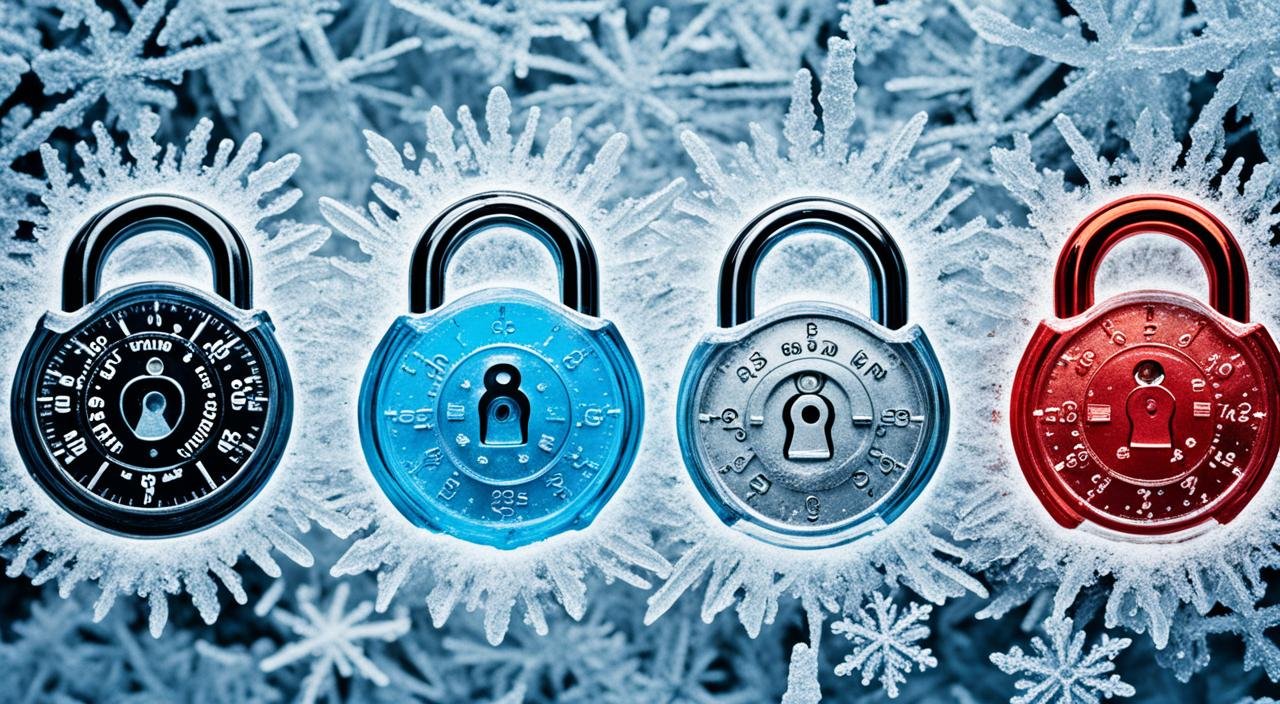Credit Freeze Vs Credit Lock: What’s The Difference?
Credit Freeze Vs Credit Lock: In today’s digital age, keeping your personal and financial info safe is key. Two ways to protect your credit are credit freezes and credit locks. They both offer security, but they’re not the same. This article will look at the main differences between them. It will help you decide the best way to protect your credit and identity from threats.
Key Takeaways
- A credit freeze makes it hard for identity thieves to open new accounts in your name by restricting access to your credit report.
- A credit lock is like a freeze but lets you quickly lock and unlock your credit report when needed.
- Credit freezes are free and stay in place until you remove them. Credit locks might cost a monthly fee.
- Freezing your credit can make it hard to apply for new credit. A credit lock is usually easier.
- Both options protect you from identity theft. The choice between a freeze or lock depends on what you need and like.
Introducing Credit Freezes and Credit Locks
In today’s world, two tools have become key to protect your financial identity – the credit freeze and the credit lock. These tools act as barriers against unauthorized access to your credit report. They keep your financial information safe and secure.
What Is a Credit Freeze?
A credit freeze, also known as a security freeze, is a free service from Experian, Equifax, and TransUnion. It restricts access to your credit report. This means lenders can’t check your creditworthiness for new credit applications. It greatly lowers the risk of criminals opening accounts in your name.
What Is a Credit Lock?
A credit lock is a service that lets you lock and unlock your credit report instantly, often for a fee. It’s different from a credit freeze because it’s easier to manage. You can quickly secure your credit file and control who can see it. This adds an extra layer of financial identity protection.
Both credit freezes and locks are strong ways to protect your credit access. They let you control who sees your financial info. But, they work differently, so it’s important to know the details to choose what’s best for you.
The Process of Freezing and Locking Your Credit

How to Freeze Your Credit
Freezing your credit is a smart move to keep your credit report safe. It stops identity thieves from opening new accounts in your name. To freeze your credit, you need to contact the three big credit bureaus – Experian, Transunion, and Equifax. They’ll ask for your name, birth date, Social Security number, and proof of who you are and where you live.
You can start a credit freeze online, over the phone, or by mail. When it’s done, lenders can’t see your credit report. This means they can’t approve new credit applications. It keeps your credit report safe and protects your financial info from misuse.
How to Lock Your Credit
A credit lock is like a freeze but easier to manage. It stops new accounts from being opened in your name. You can set up a credit lock online or through apps from the credit bureaus.
With a credit lock, you can easily turn it on or off. This lets you unlock your report for things like applying for a loan or a new credit card. It’s a great choice for those who want good credit protection without the hassle.
“Freezing your credit is one of the best ways to protect yourself from identity theft and fraudulent credit applications.”
credit freeze vs credit lock: Advantages and Disadvantages
When it comes to protecting your financial info, you have two main choices: credit freezes and credit locks. Each has its own pros and cons. Knowing these can help you pick the best way to keep your financial info safe.
Advantages of Credit Freezes
A credit freeze is free and comes with federal guarantees. It stops new credit accounts from being opened in your name. This makes it a strong shield against identity theft. Plus, you can freeze your kids’ credit reports too, keeping your whole family safe.
Another big plus is that a credit freeze doesn’t hurt your credit score. Unlike credit locks, it doesn’t affect your credit score at all. This means your credit report stays intact without any harm.
Disadvantages of Credit Freezes
Even with its big benefits, a credit freeze has some downsides. Freezing and unfreezing your credit can take time and effort. You have to contact each credit bureau yourself and give them your details.
Some people find starting and managing a credit freeze harder than a credit lock. Credit locks are often easier to set up through one place, like a bank or credit monitoring service.
Choosing between a credit freeze and a credit lock depends on what you need and like. Both can protect your credit and keep your financial info private. Knowing their pros and cons helps you decide what’s best for you.
When to Use a Credit Freeze vs. Credit Lock

Choosing between a credit freeze and a credit lock is key to keeping your finances safe and fighting identity theft. Both methods provide strong credit security measures and credit access control. But, the right choice depends on your situation.
If you think someone has stolen your identity or found suspicious activity on your credit report, these tools can help. A credit freeze is great if you want a simple, free way to protect your credit. On the other hand, a credit lock might be better if you want extra identity theft protection services.
- Think about a credit freeze for a basic way to fight credit fraud.
- Choose a credit lock for more personal finance security features like identity theft monitoring and help to fix problems.
Deciding between a credit freeze and a credit lock depends on what you need to protect your financial info and identity.
“Protecting your credit is crucial in today’s digital world. The choice between a credit freeze and a credit lock greatly affects your financial well-being.
Also Read: High Rates? Find Low Interest Credit Cards!
Conclusion
Credit freezes and credit locks are great ways to protect your financial identity. They keep your credit info safe from fraud. The main differences are in cost, ease of use, and extra features each offers.
Knowing the pros and cons of credit freezes and credit locks helps you decide how to protect your credit and personal information. It’s important to use either option with all three major credit bureaus. This ensures full fraud prevention and consumer credit safety.
Both credit freezes and credit locks are key for identity theft protection. They help keep your financial data privacy and personal information safeguards safe. By taking these steps, you can better manage your credit monitoring services and credit bureau alerts. This way, you can protect your financial health and feel secure.
FAQs
Q: What is the difference between a credit freeze and a credit lock?
A credit freeze is a free service that stops lenders from checking your credit report. It’s guaranteed by law. A credit lock is a paid service that lets you lock and unlock your credit report instantly.
Q: How do I place a credit freeze?
To freeze your credit, give your name, birth date, Social Security number, and ID and address proof to the credit bureaus. You can do this online, over the phone, or by mail.
Q: What are the advantages of a credit freeze?
A credit freeze is free and stops new credit accounts from being opened in your name. It’s a strong way to fight identity theft. You can also freeze your kids’ credit reports. It won’t affect your credit score.
Q: When should I use a credit freeze versus a credit lock?
Use a credit freeze if you think your identity has been stolen or you see fraud on your credit reports. It stops new credit accounts from being opened. Choose a credit freeze for a free, legal option without extra features.
Consider a credit lock if you want more identity theft protection services. These services are often part of the subscription.
Q: What are the disadvantages of a credit freeze?
The big drawback of a credit freeze is it can be hard when you need new credit. You have to unfreeze your credit each time, which can take days. This might slow down your credit application.
Source Links
- https://lifelock.norton.com/learn/credit-finance/credit-freezes-vs-credit-locks
- https://www.experian.com/blogs/ask-experian/whats-the-difference-between-credit-freeze-and-a-credit-lock/
- https://www.nerdwallet.com/article/finance/credit-lock-and-credit-freeze
